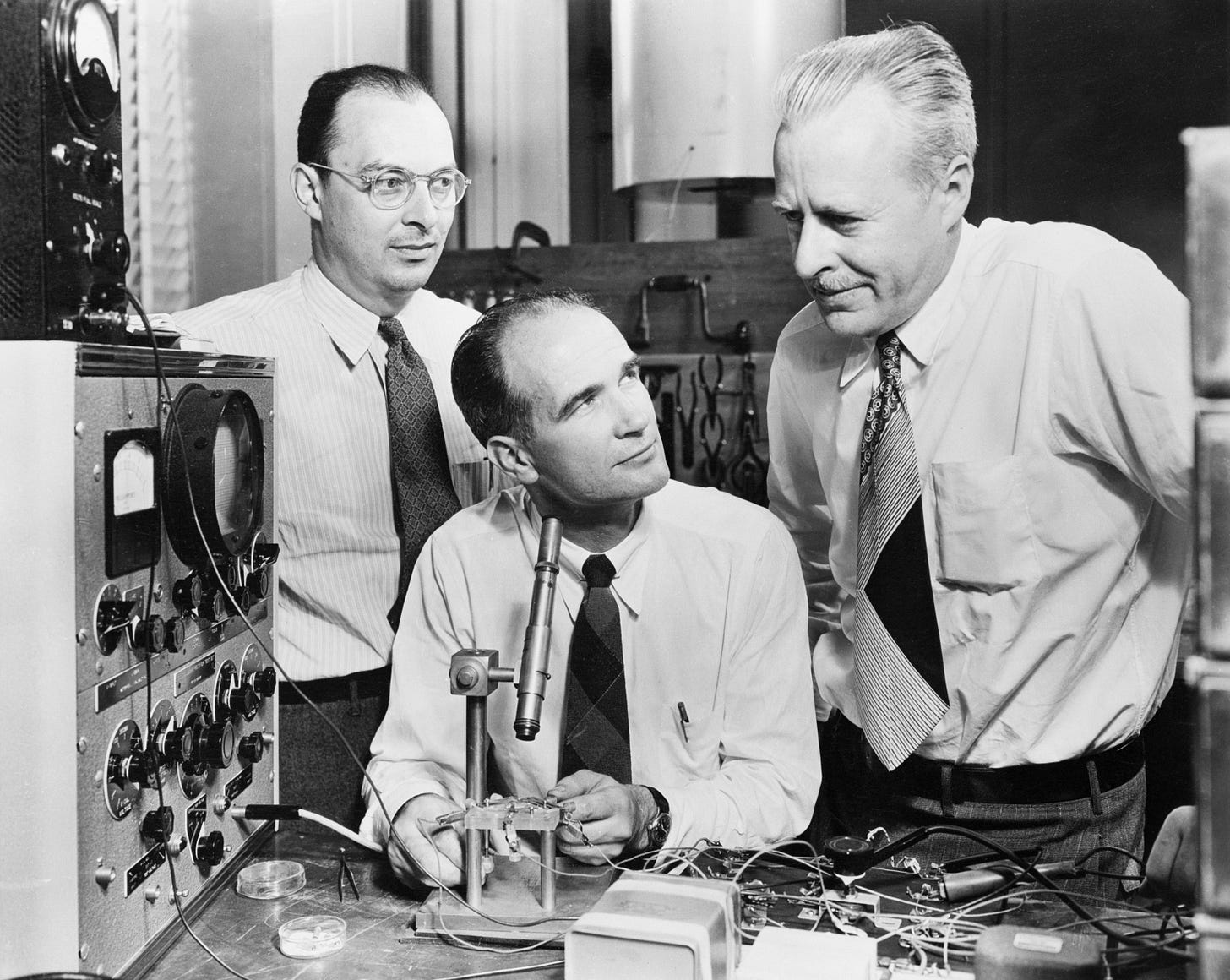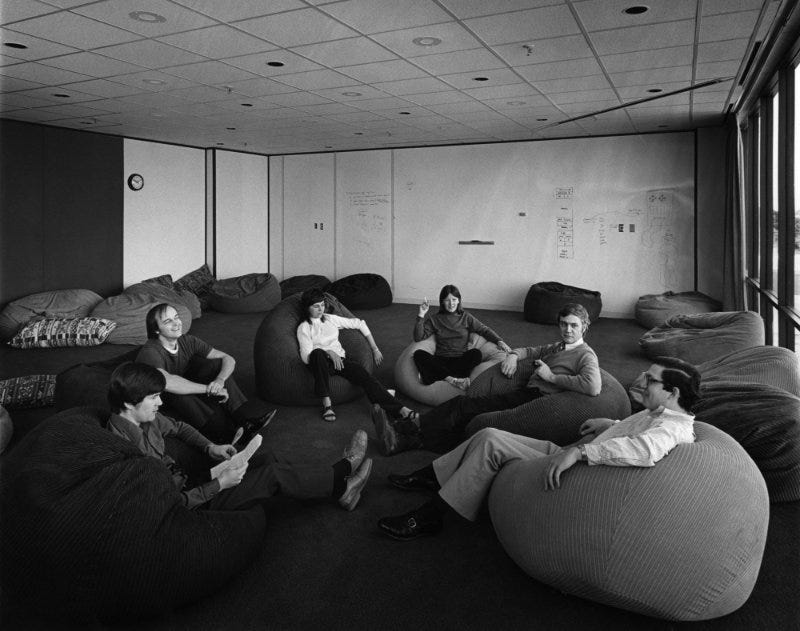Exclusive: Altman And Masa Back a 27-Year-Old's Plan to Build a New Bell Labs Ultra
Episteme and Louis Andre would like to fix science
There’s very little about Louis Andre on the internet, which will stand out as strange in a few paragraphs’ time.
I can tell you that he’s 27 years old and grew up in Europe. He has a French mother and a father who hails from Madagascar. Andre began studying neuroscience and computer science at University College London before embarking on a scientific odyssey, hopping to labs at Princeton and Stanford and a Parkinson’s disease-related biotech startup backed by Sergey Brin.
Those who know Andre say he’s smart and well-liked and that he did good research. None of his projects, though, were obvious blockbusters. For the most part, Andre has shuffled about behind the scenes, living off research grants and brief stints at small companies.
As of Monday, however, Andre will find himself at the center of much attention. He’s revealing a new company called Episteme that’s backed by Sam Altman, Masayoshi Son and a host of other (as of yet) undisclosed investors, as Core Memory can report exclusively. Based in San Francisco, Episteme is an effort to create a modern-day Bell Labs or Xerox PARC in that it hopes to attract the world’s top scientists and have them work on a wide range of potential breakthrough products.
“We want to step in and be able to support individuals who are really thoughtful and want to work on meaningful ideas but feel stuck or don’t see a future in existing systems,” said Andre, who is the CEO of Episteme. “There are a lot of brilliant people who are disillusioned by the current way of doing science.”
The origin story of Episteme goes back a few years to a conversation Andre had with Altman. The two men were discussing well-known frustrations with the science and research landscape. Many of the world’s brightest minds in academia spend most of their time writing grants, managing bureaucratic overhead and publishing papers instead of pursuing their real work. Meanwhile, venture-backed start-ups often come with near-term financial pressures that do not give the biggest, riskiest ideas the needed runway to flourish. “Sam and I were like, ‘We should do something about this,’” said Andre. “We should try and do something different.”
The plan they came up with centers on giving researchers a healthy paycheck along with lab resources and a chance to own shares in Episteme. In other words, the scientists can do away with fundraising pressures and grant writing and spend most of their time on research.
In addition, Episteme wants to help the researchers turn their ideas into blockbuster products. The company will surround the scientists with people to help deal with intellectual property concerns, tax issues, hiring and other day-to-day support functions. It has also brought on key hires from places like the Gates Foundation and the Department of Energy to help shape the path from research to product.
Corporate research centers like Bell Labs and Xerox PARC have a near mythical reputation. Bell Labs birthed the transistor, the laser, information theory, the Unix operating system, cellular technology and on and on. The technology created at PARC during the 1970s remains the foundation of a great deal of PC- and Internet-era computing.
The model they set was one where the research arm of a large company had relative freedom to pursue big, risky ideas. The scientists were shielded from upper management to a degree and did not have to bow to their companies’ core businesses and profit concerns.
The tech industry and Silicon Valley embraced this model well into the 1990s and the early 2000s. IBM had labs all over the country, and its Almaden Research Center in San Jose was a particularly glorious place. In a building nestled in the countryside, scientists were free to do foundational research. The hope was always that they would hit on a big breakthrough that would lead to a new business for IBM, but IBM also took pride in pure scientific achievement and the accomplishments of its staff.

Sun Microsystems, Intel, Hewlett-Packard and others also had famed research labs. They would annually bring reporters like me in to hear from their scientists and look over their breakthroughs. Google’s X has been the most contemporary attempt at replicating these older labs – with mixed success.
Cut to 2025, however, and many of these labs are gone or are a shadow of their former selves. The need to placate shareholders quarter-to-quarter has often quashed management’s desire to support free-wheeling, expensive research arms. Many companies have also chosen to rely on Silicon Valley’s vibrant start-ups and acquire their innovations instead of building them in-house.
It’s in bio-tech where billionaire-backed, open-ended research organizations have been more prominent. Howard Hughes Medical Institute and the Whitehead Institute are classic examples of organizations meant to give scientists relative ideological and fiscal freedom for their research. More recently, the Chan Zuckerberg Initiative, the Arc Institute and the Allen Institutes have managed to pull top scientists out of academia and into their labs and have produced quite stunning results.
Episteme’s pitch is more wide-ranging and open than a corporate lab or a bio-tech research hub. The company wants to attract top minds from a variety of fields and has no central objective or area that it’s pushing people to pursue.
“It’s a broad range of disciplines,” said Priyamvada Natarajan, the chair of the Department of Astronomy at Yale and an advisor to Episteme. “It’s AI, energy, materials, novel battery systems and new kinds of superconductors. It’s inspired by Bell Labs or Xerox PARC but adapted for today’s scientific milieu. I think that’s what makes it a new kind of accelerator.”

Andre said the Episteme team has identified about 2,400 researchers it would like to try and recruit. The company, though, is starting with 15 scientists in fields like energy, computation and neuroscience. This original group will work out of a facility in San Francisco, although Andre hopes to create multiple Episteme offices worldwide.
“We assess three, key things,” Andre said. “One is the scientific substance of their work. The second is their technical and execution abilities. And the third, which is perhaps the most important, is their theory of change. We want people who have a deep personal motivation and a certain idea of what the world might look like in the future.”
These types of investor-led research centers can come with major drawbacks. Quite often, the funders lose interest in the projects and pull their money. Just last week, reports hit that the much-ballyhooed Arena BioWorks was winding down its operations after just two years, despite $500 million in backing from the likes of Steve Pagliuca and Michael Dell. And, quite often, scientists leave academia for supposedly comfier confines only to find that their backers want to see quick results.
Both Andre and Altman confirmed that Episteme most certainly has commercial aspirations. The researchers will be judged via regular assessments, and the hope is that products produced by the scientists make Episteme self-sustaining. That said, they both also emphasized a desire to give the researchers as much freedom and time as possible. “I would put minimal pressure on them,” Altman said. “I think these things are ready when they are ready. Sometimes a project takes two months and sometimes it takes ten years. Louis’s vision is aligned with my own on what it takes to build a long-term research organization.”
Altman declined to disclose how much money he’s put into Episteme, and Andre declined to reveal how much funding he’s raised to date. It’s fair to say that Episteme does not fall into one of Altman’s mega bets in the spirit of Helion, Retro Bio and World. Andre said there are other wealthy backers beyond Altman and Masa who have agreed to invest in Episteme under the assumption that they might not see returns for many years.
To even flirt with the idea of making something as prolific as Bell Labs or Xerox PARC in their heydays can come off as hyperbolic. Still, it’s a good moment to take a stab at such an endeavor.
The Trump administration’s cuts to scientific research and battles with a handful of prestigious universities have had devastating effects on academia. Lab funding has been curtailed. Job openings have vanished. “The uncertainty is the big thing right now,” said Natarajan. “I don’t know what to tell my early career people, my young postdocs. It’s just not clear what the budgets will be for research.”
Even people who abhor what has happened to the sciences will often concede that university and government lab bureaucracy has become far too onerous. Huge amounts of money meant to go towards research has been consumed by university overhead.
If a new research center can appear that offers more security and more efficiency, it really could have a chance at attracting the world’s top minds. “It’s particularly timely to offer this type of alternative,” Natarajan said.
China, of course, looms as well. Over the past few years, Chinese universities have turned the country into a science superpower. This is potentially terrible news for the US, which has ceded manufacturing and huge swaths of hardware innovation to its rival. China is making steady gains on the US in terms of software and artificial intelligence technology and is also becoming a major bio-tech force. The last thing the U.S. needs is a massive scientific self-own. Anything that course corrects here would be helpful.
Andre hopes that Episteme could help unlock a flood of innovation in key areas and revive the US’s fortunes. “Science is not bottlenecked by the availability of talent,” he said. “It’s bottlenecked by the lack of operationalization and business rigor to actually convert science into concrete applications that society can use. Our goal is to build a third way distinct from academia and distinct from industry where brilliant scientists can pursue their own ideas without having to become entrepreneurs or grant writers.”
One of the initial researchers to join Episteme is Ben Angulo, who is completing his PhD at Harvard’s famed Church Lab and will open his own lab at the new company in early 2026. Without going into exact detail, Angulo said his research will “be broadly focused on gene and cell therapies. Hopefully, ones that can cure human diseases.”
Angulo, 36, had a number of other post-Harvard opportunities but said the choice to go on the Episteme adventure was a relatively easy one.
“In academia there are promising programs being prematurely cut,” Angulo said. “And, if I were to take my research to a start-up, I’d have a very tight set of timelines to deliver on that don’t always align with how research goes.”
Angulo worked alongside Andre at OccamzRazor, the Brin-backed bio-tech start-up. He complimented Andre’s intellect and idealism. Andre’s approach to Episteme – and the name of the company – can be traced back to his love of literature and philosophy. He’s billing Episteme as a contemporary approach to the theory of knowledge and thinks he can fix a misallocation of capital and talent, which is a lofty quest.
“To be perfectly blunt, I think it had to be a younger person to do this,” Angulo said of Andre. “Louis has had exposure to industry and start-ups, but I don’t think he’s been biased yet in how these organizations run.”
Episteme obviously arrives with the usual Silicon Valley fantastical trappings. It’s going to scour the world and handpick bright, unconventional minds. It’s going to bring people from different disciplines together and hope they feed off each other’s ideas. It’s going to provide the researchers with all they could ever hope for and perhaps make them rich in the process. Bell Labs: Only Better Or Bust.
“Some people would say it sounds really idealistic,” Andre said. “I think that’s good. This is a world where things tend to be uncertain and unpredictable, and it’s important to maintain a healthy dose of idealism.”





I gave up smoking years ago, but what a joy it would be to have a cigarette while reclining on a corduroy beanbag, growing out my sideburns and inventing the future in a moonshot lab.
My heart and hopes are with Episteme. Great post as always, Mr Vance.